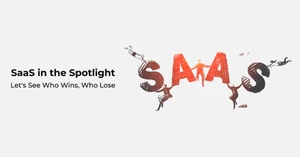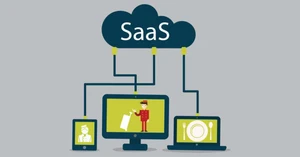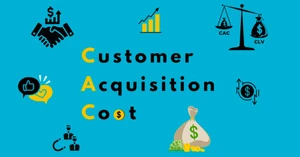Why You Need to Backup SaaS Data?
There's no denying that SaaS platforms offer significant benefits to businesses. However, the question is whether or not they safeguard your personal information. It's a prevalent misperception among businesses that it's the job of SaaS companies to preserve your data, and that SaaS backup isn't required.
Unfortunately, when it comes to SaaS data security, you are on your own. It's crucial to know that cloud service providers use a shared security responsibility approach. This means that SaaS providers are responsible for application availability and uptime, while you are responsible for data security.
SaaS companies are not liable for data loss caused by errors on your end, according to the shared responsibility paradigm. As a result, organizations must opt for SaaS cloud backup and recovery in order to preserve their data on the cloud.
How to Protect Your SaaS Data?
To safeguard your SaaS data from everything ranging between accidental deletion and hacking, follow these simple processes. It all boils down to taking your data to the right people and keeping it away from the wrong hands.
- Streamline data access: You may want to adopt a repeatable onboarding/offboarding. This might include storing data in such a format that it can be restored after offboarding.
- Recognize the dangers: You must have a thorough understanding of what SaaS data you are keeping and sharing (through APIs). For this, you may use data classification tools.
- Data access restriction: You might want to deploy advanced security measures in your SaaS platform including the implementation of robust password policies and multi-factor authentication. You can prevent data loss incidents by adopting the best data security practices.
- Keep data exposure to a minimum: You might want your team to develop certain data security policies that limit the sorting of sensitive data stored in SaaS platforms. This practice will help reduce overall data risks.
- Quick and convenient data backup: Choose a backup system that allows you to restore your data quickly, conveniently, and effectively, rather than just backing it up. Look for a solution that has these features.
- Maintain vigilance: Now this one is a no-brainer. When you are using SaaS platform tools and third-party solutions, ensure implementing both preventive and real-time policy enforcement.
- Automated and on-demand backups: While "set it and forget" procedures are indeed essential, you should also be able to manually back up data at any time.
- Scalability: Look for a solidly scalable system, as it will help both large and small businesses to maximize their productivity by fully utilizing their resources.
- Multiple layers of operational and physical security: In order to protect the integrity of your data, you need multiple layers of operational and physical security.
- Quick, simple point-in-time restores: Admins should have rights to retrieve data and restore it to its original state at any moment. Make sure your cloud SaaS backup comes with these features.
What Is SaaS Backup Software?
A SaaS backup solution assists corporations in securing and preserving the integrity of the data that have been generated by the SaaS products they use. These tools prove to be extremely beneficial during unfortunate events when the SaaS data is compromised, tampered, or lost.
Some SaaS cloud backup systems are tailored to a single SaaS product, while others are more generalist in nature and backups data from multiple SaaS solutions simultaneously. Cloud SaaS backup solutions work with a wide range of software programs, including CRMs, corporate instant messaging applications, office suites, and email systems, to name a few.
SaaS backup software helps:
- Preserve critical SaaS-generated data and provide a recovery point in case SaaS data is lost.
- In the implementation of compliance and governance laws and policies.
What’s the Use of SaaS Backup?
Any software that is licensed and provided over the cloud rather than installed on-premises is referred to as a SaaS product.
Companies can save money using SaaS cloud backup and storage. Businesses might also benefit from the SaaS backup software’s stronger data security features as compared to what’s generally available on-site.
SaaS backup software stores and protects data generated from SaaS products. SaaS backup software stores the data in multiple tiers so that if the software fails, the data remains secure.
SaaS backup and recovery solution helps enterprises defend their endpoints from a number of attacks. The software enables data encryption and integrity, which is an advantage for firms engaging in the BFSI sector.
Why Use SaaS Backup Software?
SaaS backup software is part of a wider ecosystem of data management and security products. The ecosystem as a whole provides data security, quality, compliance, and reliability. SaaS backup, in particular, helps with compliance and reliability.
With a proper SaaS backup solution in their arsenal, business houses can ensure the safe copying and secured storage of SaaS-generated data in a different location for future recovery purposes. SaaS backup software also ensures that all compliance-related data is not only effectively secured but also the entire process is compliant with key regulations.
Key Features of SaaS Backup Software
Here are some of the most common features of SaaS backup software programs:
- Data backup: The primary goal of SaaS backup tools is to produce a copy or copies of existing SaaS data and store them securely in a separate location, such as a cloud storage site or on-premise.
- Integrations: Users can integrate a SaaS backup solution with one or more SaaS products to gain access to the data stored in those products. SaaS backup systems are able to integrate with other tools that a business might use on a daily basis, such as backup management, data management, and data security.
- Data designation: SaaS backup software, like other backup solutions, allows organizations to choose which types of data created by the SaaS product should be backed up. This can assist organizations to avoid storing unnecessary data in their backup storage location.
- Security and compliance: SaaS backup systems can provide either simple data security features (similar to access authentications) or easy integrations with other security technologies. Many solutions additionally include elements for preserving data compliance in order to comply with the growing number of global data privacy rules.
What Does SaaS Backup Software Do?
Organizations using SaaS applications often face data loss incidents arising from accidental deletions, cyberattacks, and even inadequate backup and restore capabilities offered by the app providers. SaaS Backup Software can protect data in SaaS applications against loss.
There are tailored SaaS backup software solutions that integrate with distinct SaaS platforms while others offer integration options for several different SaaS applications. The data present in these applications is stored either in the cloud in an alternative data center or on-premise. If the data gets lost from the SaaS application, you can use the backup to restore the SaaS application to its previous state.
Benefits of SaaS Backup Software
SaaS backup software can safeguard your SaaS app data and ensure detailed recovery of items. There are several other advantages of SaaS backup software as discussed next.
- Ensure preparedness and business continuity: The continuity of your business operations is heavily impacted by data. By having a SaaS backup software, you ensure that primary assets are restored quickly in the event of a disaster so that mission-critical services are least impacted.
- Save legal and regulatory compliance fees: Regulatory compliance is difficult to ensure in SaaS applications as users do not have complete control over their data. SaaS backup software saves data and helps adhere to data retention guidelines even when the storage duration for the SaaS application gets complete.
- Ensure data authenticity and immutability: SaaS backup software prevents accidental deletions by preventing premature deletions or expirations before due date. Also, if someone bypasses security and accesses the stored data, they will only see encrypted data. This helps ensure immutability and authenticity of backup data.
- Easy migration to another SaaS provider: When migrating from one SaaS provider to another, you need data backup to avoid data loss during migration process. Data is susceptible to being lost during the process due to incorrect policies, access permissions, protection mechanisms, employee errors, etc. A SaaS backup software can ensure smooth migration to another provider without any critical data loss.







.jpg?d=131x98)















